Where The Water Tastes Like Wine Review
With every step you take, every move you make, a Sting-voiced Wolf will be watching you.
This article first appeared on USgamer, a partner publication of VG247. Some content, such as this article, has been migrated to VG247 for posterity after USgamer's closure - but it has not been edited or further vetted by the VG247 team.
The first couple hours of Where the Water Tastes Like Wine are sublime. You're tasked as a skeleton drifter who travels across the United States in the Great Depression era. You're a skeleton because your flesh was ripped off by a poker playing wolf-man before you were set on your new destiny as a folk tale collector. But most importantly, you're a salesman who deals in the business of stories; specifically in gathering tales and sharing them with the fellow travelers you meet across the country. Like a game of telephone, the stories you share will never be passed on the same as you once told it. They change before your very ears.
Then the structure of the game weighs you down. Way, way down. The map you travel across is vast and daunting. How you trek across it is arduously slow, even when you whistle to slightly pick up the pace. You can hitchhike, but half the time cars pass you by on the lone highways, and when they do stop for you, they drop you off at random spots—most of the time veering way past your intended destination. (In retrospect, this could have been a bug; but sticking out my thumb for minutes at a time waiting for a car to finally stop often felt like a waste.) You can hop on a random train to get to another major city, but there's a chance you'll be beaten to death or within an inch of your life at the end of it, booting you back to the last major city you rested in after talking to the Sting-voiced wolf-man in what seems like purgatory. If you have money, you can go to a major city's train station and avoid that potential fate, but being a drifter, that's not always an option.
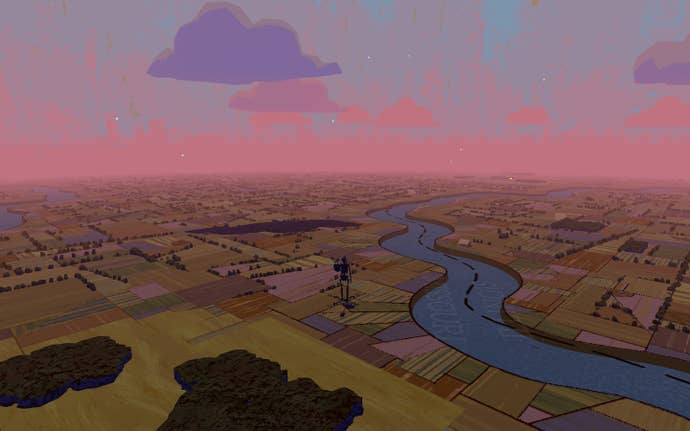
For a handful of hours, this slow pace sets the scene. The entirety of America as a land of people all carrying unique experiences and livelihoods makes for exciting potential. Then the sluggishness persists, the same few folks songs per region play ad nauseum, the game's persistent frame rate issues become more glaring, and annoyance with the quirkier aspects of travel settle in for the long haul.
Regardless of how unhurried the mode of travel is, the lone thing pushing you forward is that the stories you pick up along the way are almost always endearing. Some are tragic, like helping a farmer find his lost son, only to find that he drowned in a grain silo. Later, the story evolved drastically as I picked up on it being told from other low-poly homes across the country. In an early iteration, the son killed himself in the silo. In its third pass around, the farmer had murdered his own son. By this point, only I and the farmer knew the truth: that it was a sad accident. But American folklore wouldn't remember it this way.
Where the Water Tastes Like Wine is full of short stories like this, always told in Twine-like form with decisions to be made as you meet someone new. Sometimes decisions change the direction of the story entirely, swaying from a scary story to a thrilling one, or changing from one Tarot card-labeled section of stories to another, like "love" to "sadness." (Stories themselves are divided into five primary categories as per requests from fellow drifters you meet: scary, thrilling, hopeful, tragic, and funny.)
By the time you run into a fellow drifter at one of the map's many campfires, picking through the stories you gathered along the way is at first an intriguing venture. But the deeper I got into the game, the harder I found it to keep track of the stories I was collecting, which went from the dozens to nearing 200 fast. (In total, there are 219 "stories" to collect in your travels.) The game's one sentence descriptions are sometimes apt, but other times, I'd find myself scratching my head. What was the story of the lost ring in California again? And the singing workman in the Midwest? I had become such a collector of stories, that I was mixing them up, and serving up the wrong ones to share when a campfire companion would ask for a certain kind of tale. (Once again, I'm sorry Franklin, I know you didn't want a thrilling tale, but a tragic one.)
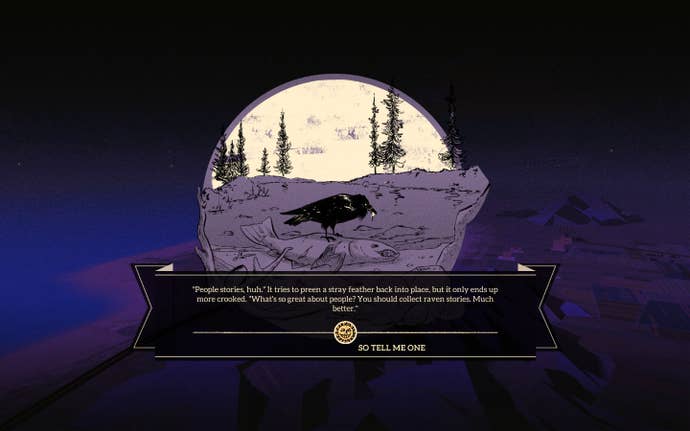
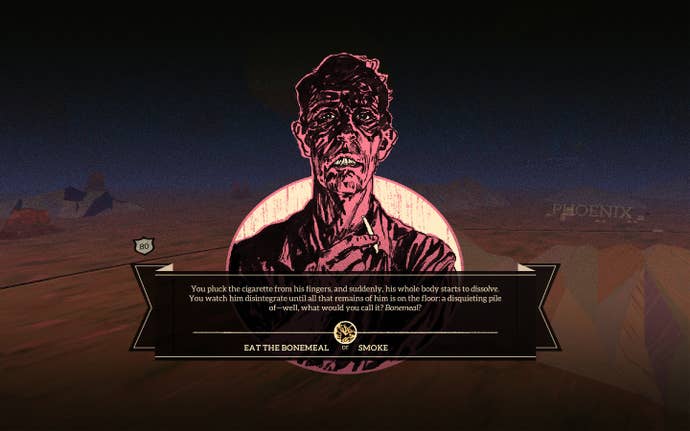
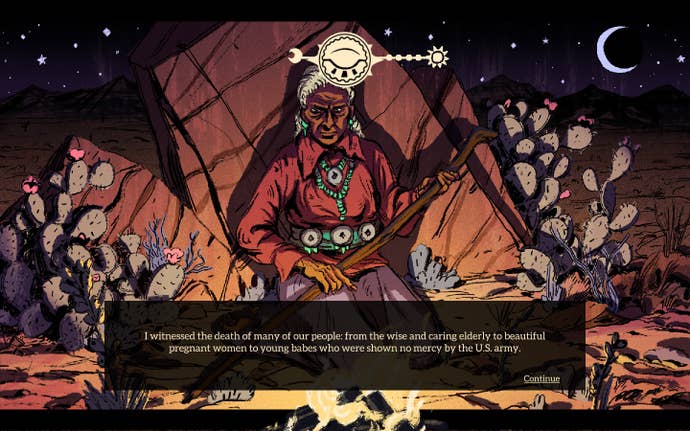
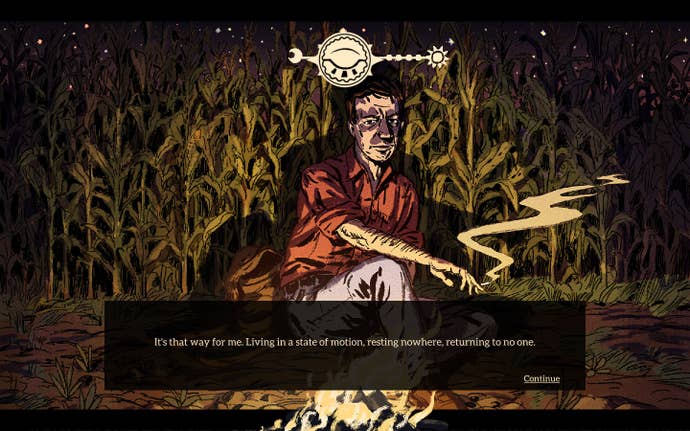
Where the Water Tastes Like Wine demands a lot from the player, in terms of remembering everything you read. It took me about 14 hours, according to Steam, to befriend all 16 drifters that hop around the United States. Your relationships with the drifters progresses if you tell them the stories they want to hear—like a hopeful or scary one—and you have three-to-four "chapters" in which you get to know them better before their own stories they share with you are through.
While the drifters' stories are diverse, well-written, and most of all memorable, the stories I traded with them ended up feeling like mere flash cards I rehearsed as a part of a routine—a routine I underwent only in order to get into the good stuff. I had my go-to stories to share for when someone would ask for a hopeful tale, and so on. In other cases, some stories could easily fall into more than one category, but the game had its own mind about their befallen genres. (An instance where a mother threw her toll-demanding, mean toddler at me, who shattered on the ground like porcelain, was not "funny" for reasons that elude me.)
You also can't retell the same tale twice to a comrade. With the density of 200-plus stories, this led me to only slightly shuffling the anecdotes in my makeshift "inventory," where three swappable anecdotes per Tarot-labeled section can be in your folklore arsenal at a time. Without a way to go back and re-read the tales I had collected to jog my memory, nor a way to track all the ways a story had evolved in the retelling process, I ended up dealing the only cards I knew: the stories that left the biggest impression, with the smaller tales seemingly swept away by the Dust Bowl.
In the end, the game surrounding the Twine-like sections ends up feeling distracting and cumbersome, doing a disservice to the mostly great writing at the game's center. The stories you collect are relegated to tabs in your mind labeled with singular moods. Without a way to revisit them beyond a descriptive sentence, they're destined to fade away, even if you hear whispers of them in an unrecognizable state somewhere across the country.
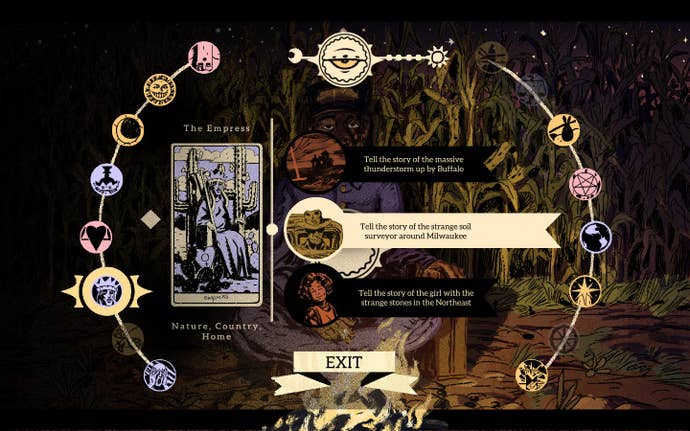
I'll come away from Where the Water Tastes Like Wine after some distance remembering it as a sweet ode to folktales, how they take on a life of their own overtime, and the many people and cultures that share them and allow folklore to thrive. I'll fondly remember some of the unique campfire companions I had, from the preacher who switched his practicing religion according to whatever town he found himself in, doubting his own beliefs in the process, to the migrant worker wishing she was in California to experience the agricultural strikes of 1933 firsthand. The stories of Where the Water Tastes Like Wine are rich and age like, well, a fine wine. It's a shame that everything surrounding them amounts to tedium and routine, as if it remembered for a moment that it has to be weighed down by the conventions of being a video game.
ConclusionOn the surface, Where the Water Tastes Like Wine seems like it has a recipe for an incredible game. It stretches the lengths of what story-driven, Twine-like games can accomplish in scope—thematically, narratively, and in terms of the dozens of writers from different cultures and backgrounds behind them. And yet, the game's onerous pace and the way it relegates the stories you collect to flash cards ends up doing a disservice to the game's strengths.

